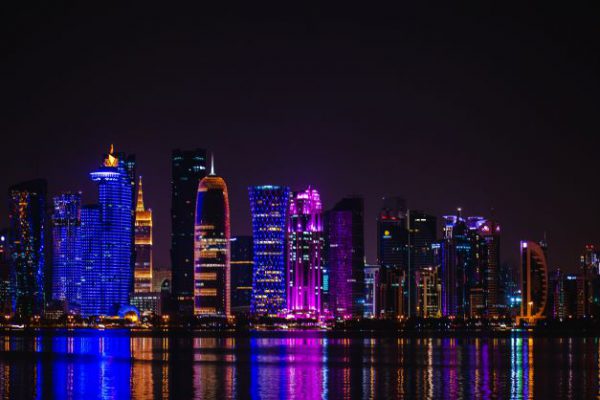World Cup 2022
World Cup 2022 – Focusing on Languages
We’re a week into World Cup 2022! There have been some exciting matches and some disappointing ones. One aspect of World Cup 2022 we find fascinating is the number of languages present. We recently asked our Instagram followers: how many of our currently taught languages are represented at the 2022 World Cup? One person correctly guessed, 7. They are: Arabic, English, French, German, Japanese, Spanish and Yoruba. If you included Korean and Portuguese, we’d give you an A for effort. While those languages have previously been taught at the CLL, they are not currently on offer. Now, you may be asking what’s the link between the most anticipated, international sporting event and languages? In our viewpoint, World Cup 2022 showcases the essential role of language in experiencing diverse cultures. In this article, we will highlight some interesting facts about the languages represented at World Cup 2022.
Arabic
 For the 2022 World Cup, the Arab-speaking world is taking centre stage, as host country, Qatar, opens up to an international audience. Qatar is accompanied by two other Middle Eastern countries, Iran and Saudi Arabia, in addition to the North African countries, Morocco and Tunisia. As is the norm with FIFA, Arabic was added to the list of official languages of the World Cup. Arabic is the only official language of Qatar, Saudi Arabia, and Tunisia. It is one of Morocco’s official languages and is also spoken in Iran (Iran’s official language is Farsi). These five countries alone represent over 170 million people, which is only a fraction of the 360 million Arabic-speakers worldwide. So, if you are reading this article in Qatar, it is highly likely that you have already learned some basic greetings and expressions in Arabic, like: hala (hello) and shukran (thank you). You might have even had the experience of seeing the pleasantly surprised reaction of Qataris when you said these phrases confidently and correctly. Or, maybe you kindled a new friendship with an Iranian fan, after you congratulated him/her in Arabic on Iran’s win. It goes without saying that, the more Arabic you learn, the richer your experience will be.
For the 2022 World Cup, the Arab-speaking world is taking centre stage, as host country, Qatar, opens up to an international audience. Qatar is accompanied by two other Middle Eastern countries, Iran and Saudi Arabia, in addition to the North African countries, Morocco and Tunisia. As is the norm with FIFA, Arabic was added to the list of official languages of the World Cup. Arabic is the only official language of Qatar, Saudi Arabia, and Tunisia. It is one of Morocco’s official languages and is also spoken in Iran (Iran’s official language is Farsi). These five countries alone represent over 170 million people, which is only a fraction of the 360 million Arabic-speakers worldwide. So, if you are reading this article in Qatar, it is highly likely that you have already learned some basic greetings and expressions in Arabic, like: hala (hello) and shukran (thank you). You might have even had the experience of seeing the pleasantly surprised reaction of Qataris when you said these phrases confidently and correctly. Or, maybe you kindled a new friendship with an Iranian fan, after you congratulated him/her in Arabic on Iran’s win. It goes without saying that, the more Arabic you learn, the richer your experience will be.
English
English is one of the five founding languages of the FIFA World Cup. It is the official language of Australia, England and The United States and one of the official languages of Canada, Cameroon, Ghana, and Wales. It is also one of the main foreign languages in Tunisia. While it is likely that the majority of attendees at the World Cup 2022 use English as the lingua franca, native English-speakers would represent the minority at this international sporting event. Unsurprisingly then, we expect that even native English-speakers attending the World Cup will learn a few phrases in Arabic, French, Spanish, Portuguese, and a host of other languages as they interact with their fellow spectators.
German
German is another one of the five founding languages of the FIFA World Cup. Most people will assume that only Germans speak German. However, les Belges and the Swiss also speak German. According to one source, there are some 95.8 million native German-speakers worldwide. In fact, according to this article, German is the eleventh most-spoken language in the world, with communities of German-speakers in every continent on the planet. So, sprechen sie deutsch? What are you waiting on?

French
French is another one of the five founding languages of the FIFA World Cup. It is spoken in Belgium, Cameroon, Canada, France, Morocco, Senegal, Switzerland, and Tunisia. But, what comes to mind when you think about French? French toast? The French soccer player, Olivier Giroud? Or do you think about the fact that the French football team has won the World Cup twice? Well, for us we are fascinated with the Belgian footballer, Romelu Lukaku. Allegedly, the footballer who speaks the most languages in this year’s World Cup, he speaks some 9 languages. In addition to his mother-tongue French, he also speaks English, Flemish, German, Italian, Spanish, Portuguese, Dutch and Lingala. Clearly, he is quite capable of eavesdropping on many of his rivals as they discuss strategy on the field.
Japanese
Japanese is the official language of Japan whose current population is over 125 million. Interestingly Japanese also appears on the list of the World Cup’s official languages. For the World Cup die-hards among us, you might recall that Japan co-hosted the 2002 World Cup along with South Korea. The Japanese are no strangers to the World Cup and their recent victory against Germany shows that they intend to go for goal!
Spanish
Spanish is another one of the five founding languages of the FIFA World Cup. It is the official language of Argentina, Costa Rica, Ecuador, Mexico, Spain and Uruguay. There are more than 20 native Spanish-speaking match officials at the 2022 World Cup. They originate from countries like Argentina, El Salvador, Guatemala, Honduras, Mexico, Peru, Spain, Uruguay and Venezuela. Now, locally, we are very familiar with Spanish. However, Spanish is more than Spanish cuisine, grammatical conjugation or tenses, Spanish verbs and days of the week. If anything that the World Cup 2022 shows us is that Spanish is equally as useful as English in international contexts. ¿Ya hablas espanol?
Yoruba
It might be common knowledge that Yoruba is one Nigeria’s main languages. However, people in other parts of West Africa, such as Ghana, the Republic of Benin, Sierra Leone, and Togo also speak Yoruba. There are also Yoruba speakers in Latin America and the Caribbean, in countries like Brazil, Cuba, and Trinidad and Tobago. Interestingly, within recent times some of our Yoruba learners have originated from Barbados, Russia, the United States, Mexico and Venezuela.
Interested in learning another language to support your team like a native in the 2026 World Cup? Or do you plan to go to one of the host cities in Canada, Mexico or The United States? We, at the CLL, are happy to help you along your language-learning journey. Beginning in January 2023, our course offerings will include, Arabic, French, German, Japanese, Portuguese, Spanish and Yoruba. We will also continue to offer courses in English as a Second Language for speakers of languages other than English. Classes will be delivered either face-to-face or remotely via Zoom. Registration begins on January 3, 2023. For more information visit our website: Non-University Students | UWI STA Centre for Language Learning or email us: cll.fhe[@]sta.uwi.edu.







